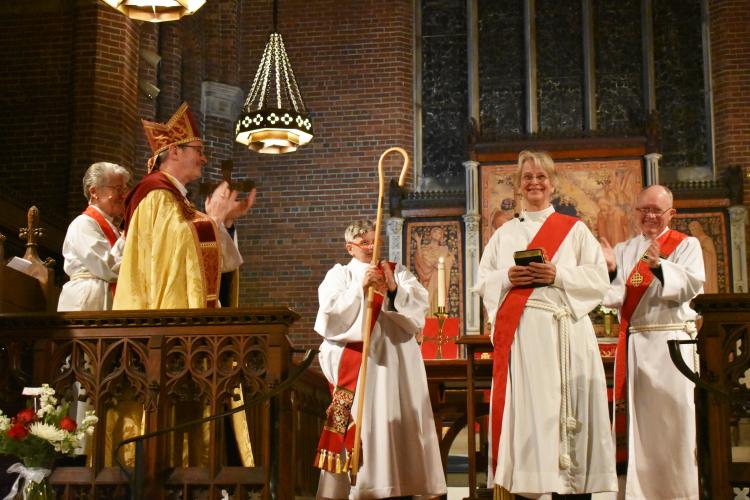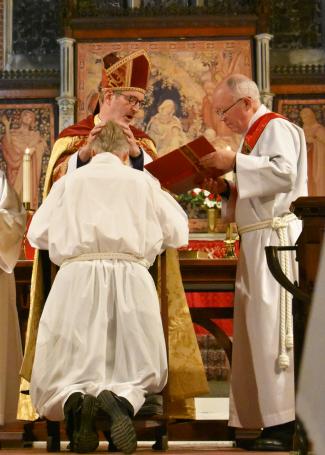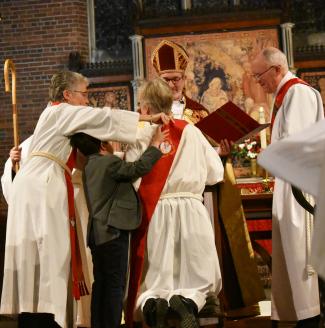This story contains references to sexual assault and suicide.
For her ordination as a transitional deacon on Nov. 10 of this year, the Rev. Gayle Pershouse Vaughan chose for the Gospel reading the passage from John 20 in which Mary encounters the risen Jesus.
"That speaks to me profoundly," she said during an interview a couple of weeks before the ordination would take place at the Parish of the Epiphany in Winchester, her home parish for the past 15 years.
"That's how far back dismissal of women goes. Mary's testimony to the apostles was dismissed. They didn't believe her," she said. "Mary encountered Jesus, she recognized him, he recognized her. She came to spread the good news, and they dismissed her because she was a woman."
When it comes to dismissal, Pershouse knows of what she speaks, having first heard the call to ordained ministry 50 years ago, at a time when, as far as the church was concerned, there was no such thing as women priests.
Nonetheless, she followed that call through the twists and turns of her life's path over decades--years of joys and sorrows and challenges as she built a career as a teacher and academic librarian; married; went to seminary; divorced; raised her children; remarried, happily.
"So it was halting. It didn't happen fast," she said. "But I never had any question from the time I first experienced that call. There was never any question in my mind of what God wanted."
After 20 years of clarity about her own call to the priesthood, Pershouse was finally, in 1986, endorsed for postulancy--the first step toward ordination--by her sponsoring parish, Christ Church in Cambridge. The diocesan Commission on Ministry approved her application two years later, only to have it rejected by the bishop at the time, the late David E. Johnson, with no explanation given.
The reason, according to Pershouse: She had refused Johnson's sexual advances.
She did not tell anyone this at the time.
"I felt such profound shame over what had happened," she said.
Another 30 years on and Pershouse would at last find herself standing in front of the altar, wearing a simple white alb, about to be ordained.
But first, forgiveness.
Before the traditional presentation and examination of the candidate, before the laying on of hands, Bishop Alan M. Gates, the current bishop of the Diocese of Massachusetts, removed his cope and miter, and facing Pershouse, said this:
"To you and to the people of God here gathered I confess the sin and abuse of power which you endured three decades ago at the hand of your bishop. On behalf of the episcopal office which I now occupy, and the wider institution which failed to prevent this abuse, I do repent, acknowledging this injustice and decrying our failure to safeguard the sanctity of the church for you and others who have looked to it with hope and trust. Of your goodness, I ask you to receive this confession, extended with genuine sorrow and a penitent heart."
"By the power of Jesus Christ who suffers with us and whose love redeems all our brokenness, I forgive you for this abuse," she replied.
It was important to Pershouse that there be a public sacramental reconciliation before her ordination, she said.
"I can't carry anger into my priesthood. I feel it's essential, not only for my healing but for the healing of the diocese, to have that act of reconciliation embedded in what we're doing," she said. "I think that for Bishop Gates to do that shows humility, integrity and courage that are astonishing."
"Who is to say what we can expect from the Holy Spirit?" the Rev. Miriam Gelfer, Pershouse's pastor and colleague at Epiphany, said in an interview, paraphrasing something a fellow parishioner had said to her and others at the news that Pershouse was to be ordained.
"This is such a wonderful thing that is happening in this time in Gayle's life and in ours. It gives me hope in the institutional church," Gelfer said, "and I think to a lot of people who have seen injustices done in its name."
* * *
Pershouse was not raised in a religious family, but she went to an Episcopal girls' school and loved attending its daily chapel service. She went on to become a teacher.
"When I started working back in the 1960s, there weren't many careers open to women. Teaching was one of them. I needed a job, and I did love teaching," she said. She was baptized as an adult and became active in an Episcopal church.
"And I just felt an absolutely overwhelming call to be a priest," she recalled. "I went back recently and found where I wrote that in my journal. It was 1968, and I wrote: 'If I were a man I would be a priest.'"
She struggled to understand why God would call her to something that was impossible, and it pained her to the extent that she stopped going to church for several years.
"It wasn't until I was in my grandmother's living room one day, and she had the television on, and reporting of the ordination of the Philadelphia 11 came on the news," Pershouse said. "I thought I was hit by lightning."
This was 1974, and the Philadelphia 11 were the women whose "irregular" ordination at the Church of the Advocate in Philadelphia defied church tradition and, along with the subsequent ordination of four more women in 1975 in Washington, D.C., led to the Episcopal Church General Convention's eventual vote in 1976 to explicitly authorize women's ordination.
The call to ordained ministry that Pershouse had struggled with and tried to set aside suddenly made sense to her.
"But at that point, I was married. I had children. I had a career. I didn't have an easy marriage to deal with, and it was basically too late, I thought, impossible."
What she described as an insistent need to redirect her life led to new work at the Episcopal Divinity School/Weston Jesuit School of Theology library and new community as she earned master's degrees in divinity and in library science.
She entered the ordination process with the sponsorship of her home parish, Christ Church in Cambridge.
Despite what she characterized as a "season of extreme difficulties" after Johnson’s rejection, she completed the seminary education and field training requirements that are part of the formation process for the priesthood. She explored the possibility of ordination in other dioceses, but felt unable to relocate out of concern for her young children and the demands of supporting them as a single mother. She went on to work as a school library director and faculty member.
She also sought out ways to answer her call to sacramental ministry through a variety of lay leadership roles, including as an assistant to the new Spanish-speaking congregation at St. Luke’s Church in Chelsea, which ultimately joined with the English-speaking congregation there.
That ministry, she said, was affirmation of her call to the priesthood, "despite rejection by the church's hierarchy."
In the decades of her formation and early lay ministry, the church was not always a friendly place to women, she said, but then neither were most workplaces.
"I was the first woman teacher at a boys' boarding school. Most everyone at that time thought women should not be teaching young men. So I had to face a lot of opposition professionally in what I had been doing, and it wasn't a surprise to me to face opposition in the church. It's a half century ago and so much has changed that it's hard to picture now what an extraordinary thing it was for a woman to say, 'I've been called to the priesthood.' I wasn't surprised when people were dismissive."
What helped her stay faithful to a call to ministry that was in various ways unsupported and thwarted over the years, she said, was her relationship with Jesus.
"I chose to follow that relationship rather than the various people who were putting obstacles in my way," she said.
* * *
On Jan. 15 of 1995, the year he was to retire, Bishop David E. Johnson committed suicide. Eleven days later, the diocese issued a statement--characterized at the time as "unusual in its candor"--announcing that Johnson had been "involved in several extramarital relationships at different times throughout his ministry" and that "at least some of these relationships appear to have been of the character of sexual exploitation."
"Our purpose in sharing this information now is to begin the critical process of healing. We seek to help any and all injured individuals in any appropriate way we can, if they make themselves and their wishes known to us," the statement said.
Pershouse did avail herself of that invitation, and, with the support of her sponsoring priest, the Rev. Robert Tobin, she did meet with Johnson's successor, the late Bishop M. Thomas Shaw, SSJE, to report her experience of abuse. Nothing, ultimately, came of it, she said.
"So when I came forward a second time"--to tell her story to Bishop Alan Gates earlier this year--"it took a good deal more courage than it took to come forward the first time."
So why do it again now, all these years later, and risk another dismissal?
"It's not something I wanted to do. In fact, I rather ferociously didn't want to do it," she said, but people in her life who knew her story urged her to share it, chief among them her husband of 20 years, Dr. Frank Vaughan. "It was probably the hardest thing I ever did, but people wouldn't let me off the hook. I prayed about it, and I realized that God was speaking to me through other people. I felt it was a message from God that couldn't be ignored."
"A part of this too has been what's going on in our national situation," she said, referencing specifically the behavior of President Donald J. Trump and the #MeToo movement, through which survivors of sexual harassment and abuse have found voice and high-profile men in entertainment, politics and news media have been called to account as perpetrators.
"It's the strength of my own outrage at hearing other people's stories that pushes me to speak up and say: No. This is absolutely not acceptable.
"Sexual assault is an egregious act of humiliation," she said. "It's a weapon used to oppress women, and in the church, it's been used to keep them from their witness. If you humiliate them enough, they won't dare to speak up."
She found it was her time to speak up.
* * *
Pershouse did not come forward with her story with the intention that it would lead to her ordination. "I had no idea that anything would come of it. I was simply reporting my experience. I had already been dismissed, and I'm quite a bit older now, and I simply did not remotely imagine that it would go further than a meeting to tell the story," she said.
"I cannot overstate how deeply moved I was by our conversation that day," Bishop Gates wrote in an Oct. 24 letter to the people of the Parish of the Epiphany in Winchester, announcing that he would be ordaining Pershouse.
"Confronting a sinful abuse of power by one in the very role I myself now occupy leaves me with an unspeakable sense of shame and remorse. This injustice is real and cannot be undone," he wrote. "At the same time, I heard in Gayle's witness and testimony the story of one who has never let go of her faith in Christ, nor of her sense of vocation to ministry in the church."
It became apparent to him that Pershouse's call to the priesthood was still an active one.
"I found that she has an extraordinarily deep and articulate sacramental theology," Gates said in an interview. "Then, in consulting with others who have been part of the wider community that intersected with her story, which I felt it was important to do, I came to understand how at Epiphany, Winchester, and at St. Luke's-San Lucas, Chelsea before that, she had enacted that sacramental theology in every way that a lay person could do. When put alongside the history of a communally affirmed call to the priesthood, it was those three things together that seemed compelling to me."
He decided that if all canonical requirements could be met through a foreshortened process, and if the appropriate diocesan oversight bodies gave their approval, he would ordain her to the transitional diaconate this fall, and to the priesthood sometime in 2020.
They could be, and they did.
"Since Gayle had already completed most of the canonical requirements for ordination while attending seminary at the Episcopal Divinity School, she was able to fulfill the remaining requirements quite quickly," the Rev. Canon Edie Dolnikowski, Canon for Ordained Vocations, explained. "Like every other candidate for ordained ministry, she was interviewed by members of the Commission on Ministry and Standing Committee, and she received their enthusiastic endorsement of her call. Both committees recognized that her ministries over the past 30 years formed her well for ministry as an ordained leader in our church."
It was at the Parish of the Epiphany in Winchester that Pershouse was able over the past 15 years to explore wider ways of understanding the call to priesthood, and she credits the former rector, the Rt. Rev. Thomas J. Brown, now the bishop of the Diocese of Maine, for helping her with that and for supporting her in liturgical roles: leading Morning Prayer, preaching, conducting services at nursing homes, teaching classes and coordinating a healing prayer team available to the congregation at Sunday morning services.
She will continue to serve at Epiphany during her time as a deacon.
"Though Gayle didn't want the ordination liturgy itself to become a kind of cause célèbre, she is ready for her story to be known, and it's important for it to be known precisely as a signal to others that we're taking the history seriously, that we want to be honest and transparent for the sake of truth and for the sake of healing," Gates said.
"If there are others with similar or analogous stories that need to be heard, my hope is that this will have engendered some sense of trust and that the circles of awareness are widening. I fully expect and hope that there will be, to use Gayle's words, 'ripples of reconciliation,' and I fully expect that it's going to be hard," he said.
Telling her story and having it be heard has been lifesaving, Pershouse said.
"My story was bottled up for so long. Now I can say I have the experience that each time I share the story and I receive support from people, I'm a little bit more healed. And what I'm finding out is that other people who hear my story find it healing for themselves, too, which I wouldn't necessarily have known at first. It can also be a permission for other people to connect to their own trauma,” she said.
"Know that you're not alone," she continued, after pausing to reflect on what learning might be drawn from what she has experienced. "I don't think everybody is as aware as I am of the presence of Jesus in our suffering, of the fact that he is there with us as we suffer. And that's what sustained me, that clear, clear perceiving of Jesus' presence. He's with me, and he's with everyone who is mistreated.
"That's why I like that passage from John that I chose, because in it, Mary says, ‘I saw the Lord.’ And I can say that, too."
--Tracy J. Sukraw
To support healing and create a more respectful and honest culture, the #MeToo Task Force of the Diocese of Massachusetts invites those who have experienced, witnessed or perpetrated sexual harassment or abuse to share their story via an online form that is available, along with additional information, at www.diomass.org/metoo. Those sharing their story can remain anonymous if they choose. They can tell as little or as much as they wish. They can choose whether or not they'd like to be contacted for pastoral support. They can also choose to make a formal report.



